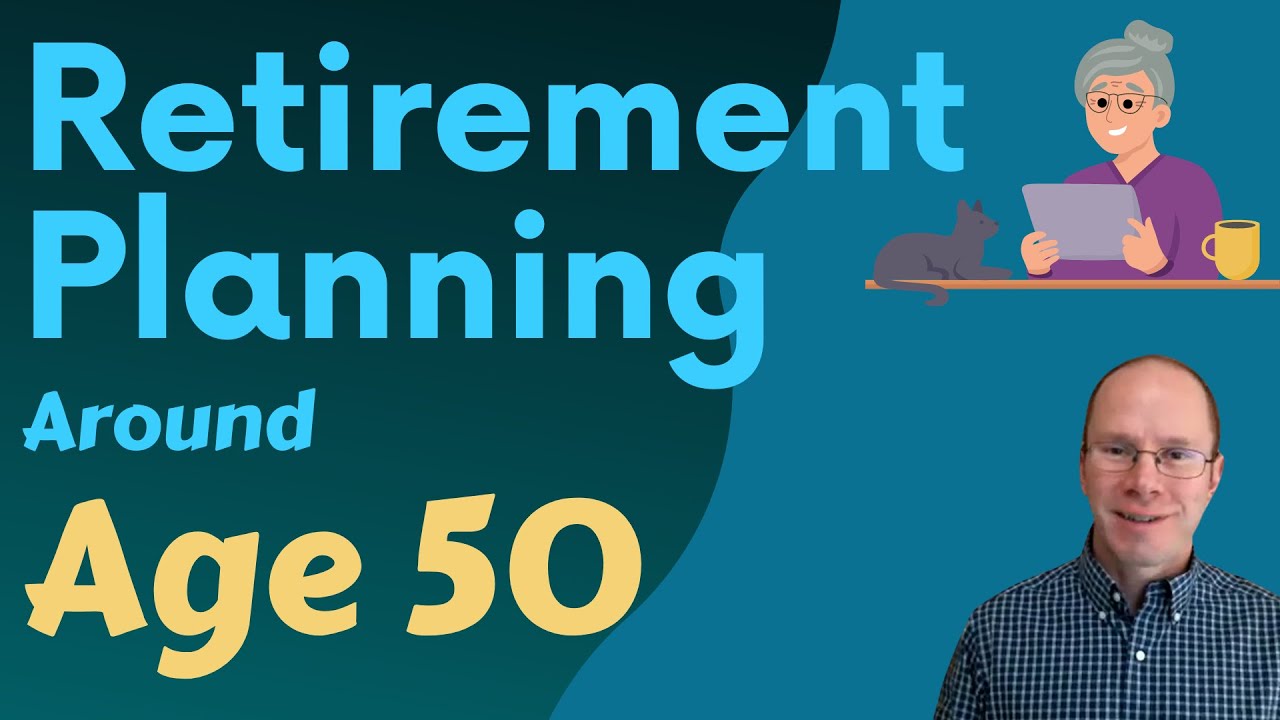
Retirement Planning in Your 50s and Beyond
Jason 0 Comments Retire Wealthy Retirement Planning Tips for Retiree's
Your 50s are an excellent time to get serious
about retirement planning, and that's because at this point in your life, you may have figured
a couple of things out. You might have a decent idea of where you
spend money, what your preferences are, the things you don't care for so much, and you
might also have some financial advantages at this point in life. Perhaps you've paid off a lot of debt maybe. If you had kids, they're out of the house
or almost independent. And you might be in your peak earnings years
because you have gained some expertise and some knowledge in whatever it is you do for
a living, and one big reason to get serious is you might have more money than you've ever
had before saved up so now it really counts. A 10 % loss in the markets, for example, hurts
a lot more than it did when you were 22 years old.
But whether you're just getting started saving
for retirement or you've been doing it for decades there are some important things that
come up in your 50s that can help you pave the way to a smoother retirement down the
road. The first thing to watch for is catch-up contributions,
and this is not the condiment, this is a catch-up contribution that allows you to put extra
into your retirement accounts each year once you reach age 50. The IRS sets maximum limits on how much you
can contribute to those accounts, but at 50, you can do a little bit extra and that helps
to boost what goes into those accounts each year for example in your 401k or 403 b or
governmental 457 you can put in an extra six thousand six hundred dollars per year as a
catch-up contribution on top of the max that you had back when you were 49 years old and
your knees didn't hurt as much.
For traditional and Roth IRAs, for 2022 that
number is a thousand dollars of extra catch-up contributions. Of course, this is assuming that you have
the cash flow to make the maximum contribution and put the catch-up contribution on top of
that, and if you don't, that's okay, it's not feasible for everybody, just do what you
can. But if you are really trying to maximize your
account balances at retirement, those catch ups are a powerful tool. The next thing to do is to look at your Social
Security and pension benefits. It's a good time to start getting a realistic
expectation of what you might get, and that's because you might assume that you're going
to get a lot more or a lot less, but it's really helpful to start figuring out how those
systems work and how much you can expect each month.
If you're eligible for Social Security, you'll
want to go through your earnings history and make sure that that is accurate because if
any years are missing you may end up with a smaller monthly retirement benefit. Your benefit is based on your 35 highest earnings
years, so you want to make sure that those good earning years are in there and that you
don't have any unnecessary zeros in your history. Keep in mind that you may be able to get some
retirement benefits from a former spouse or your current spouse, so if you're widowed
or divorced, for example, you want to research those potential benefits and you might also
be able to get income on your spouse's earnings record if you are still married and there,
are some strategies you'll want to look at as you go through that process.

By the way, I'm Justin Pritchard, and i help
people plan for retirement and invest for the future. So, there will be some resources down in the
description below that cover this in more detail and give you some other pointers. Another smart move is to manage your debts
or make a strategy for them. So, if you have consumer debts like credit
cards for example, you definitely want to plan to eliminate those debts and make sure
that your spending stays within your income limits so that you're not digging yourself
a hole during retirement or as you head towards retirement. But what about so-called "good debts" in retirement? For example, a mortgage.
There's a lot of benefit to being debt-free
and not having a mortgage payment when you're in retirement a lot of people really focus
on getting rid of that loan before their retirement date but it's not necessarily the end of the
world to have a mortgage in retirement, and paying it off quickly out of your retirement
funds can cause some problems. As long as you can fit that monthly payment
into your income maybe that's your Social Security, pensions, and some withdrawals from
savings accounts, and you can manage that debt comfortably, then again, it's not the
end of the world, and remember that that loan payment will eventually go away someday which
frees up cash flow for other expenses maybe health care expenses later in life. Speaking of expenses, how much are you going
to need to spend? Well, that's something to start figuring out
and there are a couple of different ways to do that this video that's going to pop up
above will give you some pointers on that but basically you can look at your spending
today and maybe adjust that for inflation or you might look at an income replacement
ratio and say maybe I just need 80 percent of what I'm earning now that might or might
not be right for you or you can target a certain level of spending such as $50 or $100,000
whatever the case may be, and with those numbers you can set a goal to start heading for once
you have an idea of your spending and your retirement income sources and your assets
then you can run some calculations and again we're setting your expectations so that you
know if you're on track or not and this can alert you to some potential shortfalls or
maybe let you know if you could retire earlier than maybe you expected there are a lot of
helpful online calculators out there they can do a decent job of getting you in the
ballpark but make sure you understand what their limitations might be so they don't necessarily
get super detailed and you might not be able to adjust all of the assumptions but again
you can get some basic ideas of if you're sort of close or if you're way off on what
you expected another good move in your 50s is to refine your investment strategy so up
to this point you may have been doing some great things to get you to the point where
you are you've built up some nice assets but if you've been using high risk strategies
maybe speculating maybe day trading that sort of thing it's time to ask yourself if that's
something that you want to continue doing at this stage in life it is difficult to consistently
get good results with those high risk approaches and you might have more to lose now than you
did previously.
I'm not saying you can't do it or definitely
don't do it but I would say proceed with extreme caution and maybe just say hey I've done a
good job up to this point maybe I'll reevaluate what I'm going to do going forward. At 50 it's time to start thinking about long-term
care if you haven't already been thinking about it there's a 70 percent chance that
you might need some type of long-term care and that might include everything from somebody
helping you out at home maybe this is a loved one assuming you have somebody at home who
is willing and able and remember it could be physically and emotionally difficult and
it might require expertise but it could include somebody helping you out at home who you know
or you going into a skilled nursing facility and paying those higher costs that are associated
with that higher level of care there are several ways to deal with the costs and that might
include a long-term care insurance policy but those are kind of problematic so definitely
look into them but consider some other alternatives as well maybe instead of maybe to supplement
or maybe you just go with insurance but some other options include saving up assets and
earmarking those for a long-term care event or maybe looking at your home equity as a
safety net to cover some of those big expenses that's not necessarily a fun way to spend
your time so one of the other things you can do is envision how you want your retirement
to unfold and this is a really important step that a lot of people skip it's important to
have something to do with yourself once you stop working you might have gotten a lot of
your social engagement a lot of your meaning and some of your identity out of your work
and you might want to not necessarily admit that but for a lot of people that's the case
it's easy to say that the main thing you're looking forward to in retirement is not going
to work but you probably want to have some ideas on how you're going to fill your time
and that way you're going to number one enjoy it more and number two there might be some
real benefits in terms of your mental and physical health if you are retiring to something
as opposed to just retiring from work, so ask yourself how will you fill your days? What are you most excited about and interested
in? What can you do to find some meaning and some
purpose during that time? And who might you spend time with, and what
are your plans for keeping your physical health as good as you can possibly keep it? So, I hope you found that helpful.
If you did, please leave a quick thumbs up,
thank you, and take care..
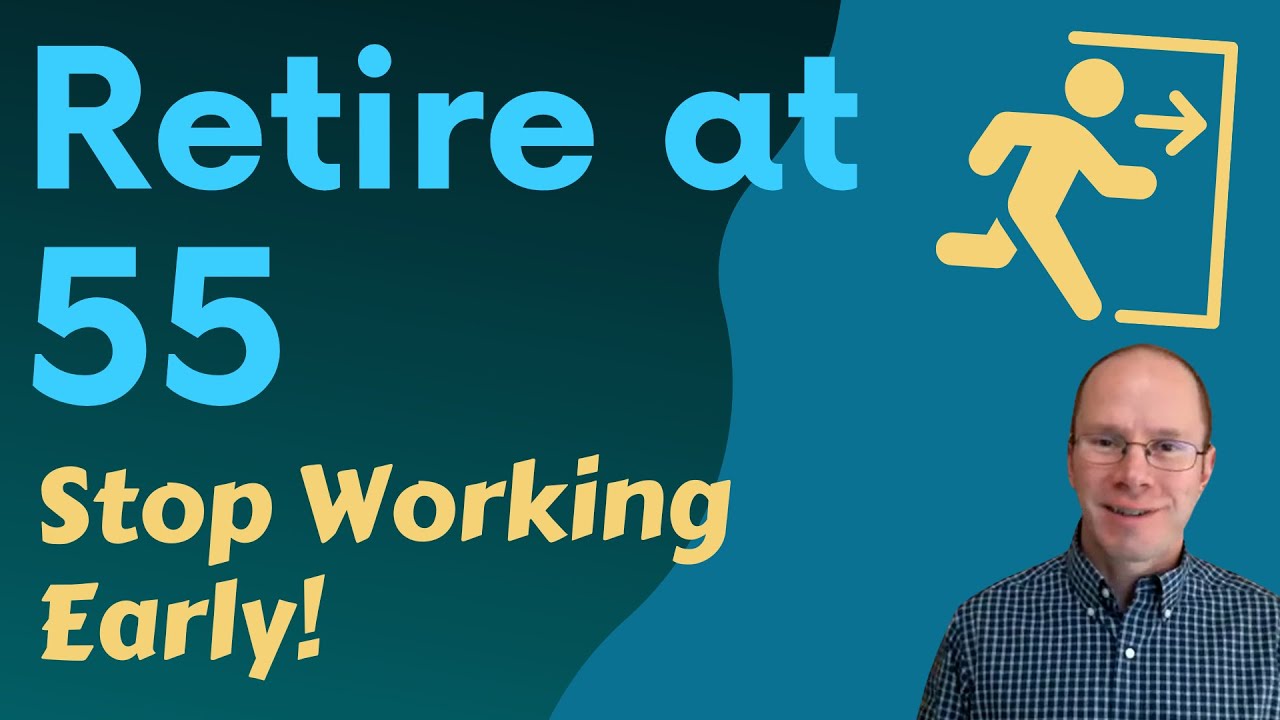
Can I Retire at 55? Tips for Early Retirement
Jason 0 Comments Retire Wealthy Retirement Planning Tips for Retiree's
If you're thinking of retiring at 55, you want to be careful about where you get your advice and guidance, and that's because most retirement advice is geared toward those who retire quite a bit later, in fact… Most people retire at 62, but things will be different for you if you're going to retire at 55. So that's what we'll talk about for the next couple of minutes here, we'll go over where you can get the money from, and how that works with taxes as well as healthcare, then we'll look at some actual numbers and what it might look like for somebody who retires at age 55. We might also want to get philosophical just briefly and ask the question, Why age 55? Yes, it's a nice round number. And there are some interesting tax strategies that are available around that age, but let's say you could retire a little bit earlier at 54, would you want to make that happen? Or if you worked a few more years… I know you'll think this is crazy, but if you worked a couple of more years and you could not impact your finances, but still take some of those dream vacations and spend time with loved ones, would that be worth it to maybe work until 59, for example? So we want to figure out exactly why you are pursuing a particular goal and then we can improve the chances of success for you, so let's start with health coverage, this is a tricky one because you're retiring quite a bit earlier than most people who might be near that Medicare age, so you have a number of different options to continue being covered, and it is a good idea to have real health insurance coverage just in case something happens.
So a couple of your choices include, number one, you can continue your current benefits from a job if you have them for up to 18 months in most cases, and that's under COBRA or your state's continuation program, that can get quite expensive because you're going to pay the full price, if you weren't already doing that, plus perhaps a teeny little bit extra for administration, but it is a way to continue with the program that you currently have, so that can be helpful if you are mid stream in certain treatments or if it's going to be hard to get certain benefits that you currently have on a different health care program, unfortunately, that's not usually a long term solution because we need to get you until age 65, which is when most people enroll in Medicare, and you should see your costs go down quite a bit at that point, maybe depending on what happens, so another solution that a lot of people look at is buying their own coverage, and that happens typically through a healthcare marketplace or an exchange, and that's where you just by coverage through an insurance company.
So you can go directly to the insurers, but it's often a good idea to go through… Start at healthcare.gov, and then go through the marketplace or the exchange, and that way you can shop some plans and potentially, depending on your income, you can potentially get some cost reductions that make it a lot more affordable, I'll talk more about that in a second, but another option is to switch to a spouse's plan, if you happen to be married and that person has coverage that's going to continue for whatever reason, that might also be a solution for you, when you leave your job, it could be a qualifying event that allows you to get on that person's program, but let's talk more about saving money on health care expenses before age 65, most people are going to buy a policy based on the factors that are most important to them, so that could be the premium or the out of pocket maximum, the deductible, the co pays, certain areas of coverage, all that kind of thing, you can select a plan that fits your needs.
Now, you might find that those tend to be quite expensive, and so if your income is below certain levels, you might be able to get effectively a reduction in the premium, it might be in the form of a tax credit or a subsidy, so here's just a preview of how things could look for you, let's say your income is, let's say 50,000 in retirement, and you need to look at exactly what income means, but there is no coverage available from a spouse, we've got one adult, and let's say you are… As our video suggest age 55 here, so you might get a benefit of roughly 422 a month, meaning you could spend that much less each month, and that's going to make it a lot easier to pay for coverage on these plans, if we switch your income down to 25,000 per year, the help is even bigger, so as you can see by varying or controlling your income, and this is something you might have some control over if you retire at 55, you can also control your healthcare costs, we'll talk about some conflicting goals here, where you might not want to absolutely minimize your income during these years, but this is important for you to know if you're going to be paying for your own coverage, and if you're experiencing sticker shock when you see the prices…
By the way, I'm going to have a link to this and a bunch of other resources in the description below, so you can play with this same calculator yourself. Now, once you're on Medicare, the cost should drop quite a bit, this is a calculator from Fidelity where we can say, let's say you are a female, and we're going to say you're eligible for Medicare at this point, so we'll bring you up to age 65. It is going to be quite a bit higher cost, if you look at it before age 65, and that's because you are paying for those private policies from insurance companies, let's say you're going to live until age 93, and so you might expect to spend roughly 5800 6000 bucks per year, depending on your health and your location and other factors, it could be more or less, but this is an estimate of what somebody might spend, a single woman each year in retirement, of course, that number is going to increase each year with inflation and deteriorating health issues.
But this is a ballpark estimate of what you might be spending in the future, now we get to the question of, do you have the financial resources to retire at 55? And that comes down to the income and the assets that you're going to draw from to provide the resources you need to buy the things you want and need, and one way to look at this is to say We want to avoid early withdrawal penalties because again, you are retiring at an age that's earlier than the typical retiree and most retirement accounts are designed for you to take withdrawals at 59.5 or later, to avoid those penalties, fortunately, you have a couple of options, so with individual and joint accounts, just taxable brokerage accounts, you can typically withdraw from those without any penalties, but you may have capital gains taxes when you sell something, those taxes may be at a lower rate than you would pay if you take big withdrawals from retirement accounts, but you just want to double and triple check that, but that can be a liquid source of funds.
You. Can also typically withdraw from Roth accounts pretty easily. So those regular contributions come out first, in other words, you can pull out your regular contributions at any time with no taxes and no penalties, what that means is that's the annual limit contributions you might have been making her by year, so the 7000 per year, for example. That money would be easily accessible, but if you have other money types like Roth conversions, for example, you're going to be very careful and check with your CPA and find out what all of that could look like. There. Are other ways to get at funds that are inside of pre tax retirement accounts, and it might actually make sense to draw on those to some extent, we'll talk more about that in a minute, but these are some of the tricks you can use to avoid an early withdrawal penalty yet still draw on those assets before age 59.5.
The first one is the so called rule of 55, so this applies if you work at a job with, let's say a 401K, and you stop working at that employer at age 55 or later, if you meet certain criteria, then you can withdraw those funds from the 401k so they go directly from the 401k to you. They don't go over to an IRA, you could withdraw those funds without an early withdrawal penalty. A complication here is that not every employer allows you to do that, so 401k plans can set a bunch of their own rules, and one of them might be that they don't let you just call them up and take money whenever you want, they might make you… Withdraw the entire amount, so if that's the case, this isn't going to work, so be sure to triple check with your employer and the plan vendors and find out exactly how this would work logistically or if it will even work. Next, we have SEPP that stands for substantially equal periodic payments or rule 72. This is an opportunity to draw funds from, let's say your IRA or a certain IRA that you choose, but before age 59 and a half without getting early withdrawal penalties.
Now, this is not my favorite choice. I don't necessarily recommend this very often at all, and the reason is because it's easy to slip up and end up paying tax penalties. The reason for that is in part that it's really rigid, so when you establish this, You calculate an amount that you have to take out every year, and it has to be the same amount every year, and you have to make sure you do that for the longer of when you turn age 59 1/2 or for five years.

And even that sounds kind of simple, but it's still easy to trip up, and you also have to avoid making any kind of changes to your accounts, so it's just really rigid and can be difficult to stick to you, so… Not my favorite choice, but it could be an option. Those of you who work for governmental bodies, maybe a city organization or something like that, you might have a 457b plan, and those plans do not have early withdrawal penalties before 59 and a half, so you could withdraw money from that and use some income, pre pay some taxes, and have some money to spend fairly easily, this by the way, is an argument for leaving money in your employer's 457 versus rolling it over to an IRA, because once it goes over to an IRA, you are subject to those 59 1/2 rules and a potential early withdrawal penalty. So that could end up leaving you with 72 to work with, for example, which again is not ideal. So you might be asking, well shouldn't I just minimize taxes and hold off on paying taxes for as long as possible? And the answer is not necessarily.
So it could make sense to go ahead and pre pay some taxes by getting strategic, the reason for that is that you will eventually have to pay taxes on your pre tax money and it might happen in a big lump, and that can bump you up into the highest tax brackets, so it could be better to smooth out the rate at which you draw from those accounts and hopefully keep yourself in lower tax bracket, at least relatively speaking.
So when your RMDs or your required minimum distributions kick in after age 72 under current law, that could possibly bump you up into the highest tax brackets, maybe you want to smooth things out and take some income early. So let's look at the question of, Do you have enough with some specific numbers, and before we glance at those numbers, just want to mention that I am Justin Pritchard. I help people plan for retirement and invest for the future. I've got some good resources, I think, in the description below, some of the things that we've been talking about here today, as well as some general retirement planning information.
So if this is on your mind, I think a lot of that is going to be really helpful for you. Please take a look at that and let me know what you think of what you find. It's also a good time for a friendly reminder, This is just a short video, I can't possibly cover everything. So please triple and quadruple check with some professionals like a CPA or a financial advisor before you make any decisions, so let's get back into these questions, Do you have enough? As we always need to mention, it depends on where you are and how much you spend and how things work for you. Are you lucky to retire into a good market, or are you unlucky and retiring into a bad market? All of these different aspects are going to affect your success, but let's jump over to my financial planning tool and take a look at an example.
This is just a hypothetical example, it's the world's most over simplified example, so please keep that in mind, with a real person, we've got a lot more going on. The world is a complicated place and things get messier, but we're keeping it very simple here, just to talk about an example of how things might look, so this person has one million in pre tax assets and 350,000 in a brokerage account, and if we just quickly glance at their dashboard here, pretty high probability of success, so let's make it a little bit more interesting and say… Maybe that IRA has, let's say, 700,000 in it. What is that going to do? And by the way, this is still a lot more than a lot of people have, but again, if you're going to be retiring at 55, you typically have quite low expenses and/or a lot of assets. So let's keep in mind here that retirees don't necessarily spend at a flat inflation adjusted level, and I'll get into the assumptions here in a second, but let's just look at if this person spends at inflation minus 1% using the retirement spending "smile," that dramatically improves their chances, and I've got videos on why you might consider that as a potential reality, so you can look into that later at your leisure, but as far as the assumptions, we assume they spend about 50,000 a year, retire at age 55.
The returns are 5.5% per year, and inflation is 3% per year. Wouldn't that be refreshing if we got 3%… So we glance at their income here age 55, nothing, and then Social Security kicks in at 70. They're doing a Social Security bridge strategy. I've got videos on that as well, or at least one video, the full year kicks in here later, and then their Social Security adjust for inflation, looking at their taxes, we have zero taxes in these earlier years because they are just not pulling from those pre tax accounts. Maybe not getting much, if anything, in terms of capital gains, maybe their deduction is wiping that out, so we may have an opportunity here to actually do something and again, pre pay some taxes and pull some taxable income forward.
In fact, if we glance at their federal income tax bracket, you can see that it's fairly low from 55 on, maybe they want to pull some of this income forward so that later in life, they are drawing everything out of the pre tax accounts all at once. It just depends on what's important to you and what you want to try to do, and that brings us to some tips for doing calculations, whether you are doing this with somebody, a financial planner or on your own, you want to look at that gap between when you stop working and when your income benefits begin from, let's say, Social Security, there's also that gap between when you stop working and when Medicare starts, and that's another important thing to look at, but what are your strategies available there? Should you take some income, and exactly how much? That's going to be an area where you might have some control, so it's worth doing some good planning.
We also want to look closely at the inflation and investment returns, and what are the assumptions in any software that you're using, for example? These are really important inputs and they can dramatically change what happens… You saw what happened when we switched from a flat inflation adjusted increase each year to the retirement spending smile, just a subtle little adjustment has a big difference on how things unfold, and in that scenario, by the way, we would typically have healthcare increasing at a faster rate. But like I said, we use an over simplified example and didn't necessarily include that in this case, but you do want to click through or ask questions on what exactly are the assumptions and are you on board with those assumptions? You may also need to make some adjustments, and this is just the reality of retiring at an early age when you may have 30 plus years of retirement left, a lot can happen, and there really is a lot of benefit to making slight adjustments, especially during market crashes, for example, so.
If things are not necessarily going great, some little tweaks could potentially improve the chances of success substantially, that might mean something as simple as skipping an inflation adjustment for a year or two, or maybe dialing back some vacation spending. These are things you don't want to do, that's for sure, but with those little adjustments, you can potentially keep things on track, and that way you don't have to go back to work or make bigger sacrifices. And so I hope you found that helpful. If you did, please leave a quick thumbs up, thank you and take care..
Read More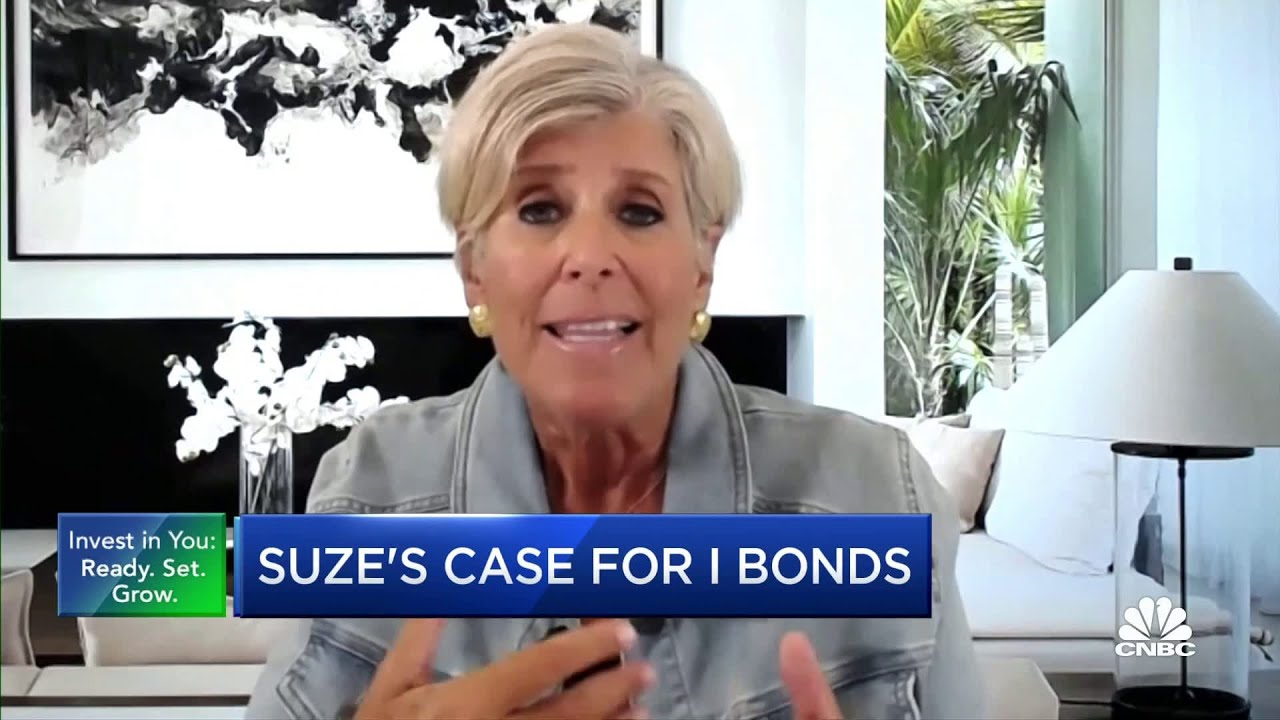
Personal finance expert Suze Orman’s number one investment right now
Jason 0 Comments Retire Wealthy Retirement Planning
SO THERE YOU SEE SUPPLY AND DEMAND AT WORK WITH INFLATION AT A HISTORIC HIGHS IN THE STOCK MARKET CHOPPY, OUR NEXT GUEST SAYS THE NUMBER ONE INVESTMENT RIGHT NOW IS I-BONDS HERE TO EXPLAIN IS A PERSONAL FINANCE POWER PLAYER AND OUR DEAR FRIEND SUZE ORMAN HOST OF THE WOMEN AND MONEY PODCAST. SHE IS ALSO CO-FOUNDER OF THE EMERGENCY SAVINGS FIRM SECURE SAVE SUZE, IT IS ALWAYS GREAT TO SEE YOU. WELCOME. GOOD TO HAVE YOU BACK WITH US. LET'S TALK ABOUT THE I-BONDS WHICH I DIDN'T EVEN KNOW ABOUT, BUTMY NEPHEW-IN-LAW SAID YOU HAVE TO GET THESE I-BONDS. EXPLAIN TO ME WHAT THEY ARE, HOW THEY WORK, HOW I BUY THEM AND FROM WHOM.
>> NOW SO YOU BUY THEM FROM THE TREASURY, DIRECTLY FROM THEM SO YOU GO FROM TREASURYDIRECT.GOV IT IS THE ONLY PLACE THAT YOU CAN BUY THEM, NUMBER ONE THEY RANGE IN PRICE. YOU CAN INVEST FROM $25 ALL OF THE WAY UP TO A MAXIMUM PER PERSON OF $10,000, ALTHOUGH THERE ARE WAYS TO DO IT WHERE YOU CAN PUT IN UP TO 30,000 IF YOU HAVE A TRUST AND/OR A BUSINESS WHEN YOU INVEST IN AN I-BOND, I STANDS FOR INFLATION, YOU HAVE GOT TO MAKE SURE THAT FOR ONE YEAR YOU DO NOT NEED YOUR MONEY AND THE REASON IS FROM THE TIME YOU PUT IT IN TO ONE YEAR YOU CANNOT TOUCH IT.
FROM YEAR TWO TO FIVE THERE IS ONLY A THREE-MONTH INTEREST PENALTY. THAT IS HOW THEY WORK. THEY ARE ATTACHED TO CPI SO RIGHT NOW WHEN THEY ANNOUNCED IN MAY, THE CPI THE YIELD ON THE SERIES I BONDS WERE GUARANTEED AND ANNUALIZED AND IT'S GUARANTEED TO YOU SO THEY CHANGE EVERY SIX MONTHS THE INTEREST RATE CHANGES EVERY MAY AND NOVEMBER SO FROM MAY UNTIL NOVEMBER EVERYBODY WHO BUYS ONE RIGHT NOW WILL BE GUARANTEED AN ANNUALIZED YIELD OF 9.62% STATE INCOME TAX-FREE OBVIOUSLY YOU'RE ONLY GOING TO GET THAT FOR SIX MONTH, BUT THAT'S STILL 4.81% ON YOUR MONEY. WHEN THEY RESET COME NOVEMBER, LET'S SAY THEY RESET EVEN LOWER. LET'S SAY THEY RESET AT 7.11 WHICH IS WHAT THEY WERE PAYING BEFORE THEY RAISED TO 9.62, YOU ARE GUARANTEED THAT FOR THE NEXT SIX MONTHS ON AN ANNUALIZED YIELD SO THAT'S, LIKE, 3.56%, HALF OF THAT FOR SIX MONTH BECAUSE THAT'S WHAT YOU'RE GUARANTEED SO FOR THE YEAR IT'S 8.37% THAT'S ESSENTIALLY HOW THEY WORK THEY'RE FABULOUS THEIR MATURITIES ARE FOR — GO ON >> I DON'T MEAN TO INTERRUPT YOU, BUT I WANTED TO ASK YOU THOSE NUMBERS THAT YOU JUST — AND I GET IT, YOU EXPLAINED IT PERFECTLY.
THEY RESET EVERY SIX MONTHS AND ARE YOU GUARANTEED UNDER THIS PROGRAM TO MAKE A YIELD IF YOU HOLD THE BONDS THAT IS ABOVE THE THEN-PREVAILING RATE OF INFLATION? >> SO WHAT HAPPENS IS YOU ARE ABSOLUTELY GUARANTEED, AND WHAT'S SO GREAT IS THAT THE ONLY WAY A FINANCE PERSON CAN EVER USE THE WORD GUARANTEE SIDE USUALLY WITH A TREASURY INSTRUMENT BECAUSE IT'S GUARANTEED BY THE AUTHORITY OF THE UNITED STATES GOVERNMENT NO COMMISSIONS OR ANYTHING SO ONCE THEY DECLARE THAT RATE ON MAY 1st AND NOVEMBER 1st YOU ARE GUARANTEED FOR WHENEVER YOU BUY IT BETWEEN THOSE PERIODS, FOR SIX MONTHS YOU ARE GUARANTEE THE RATE THAT THEY DECLARED.

AGAIN, THAT'S AN ANNUALIZED YIELD, SO IT'S ONLY REALLY GUARANTEED FOR SIX MONTHS UNTIL THEY RESET YOU KNOW, TYLER, I GAVE A MASTER CLASS ON THIS ON THE WOMEN AND MONEY PODCAST ON THE APRIL 17th EDITION OF IT. EVERYBODY SHOULD LISTEN TO IT BECAUSE IT TELLS YOU ALL THE INs AND OUTs, EVERYTHING YOU NEED TO KNOW THIS IS AN INVESTMENT. I'VE BEEN DOING THESE SINCE 2001 >> THIS DOES MAKE AN AWFUL LOT OF SENSE YOU EXPLAINED IT VERY WELL IN YOUR FIRST ANSWER IN TALKING ABOUT THE 9.6% RATE. WE UNDERSTAND THAT THAT DOES CLEAR THE LEVEL OF INFLATION, BUT IF INFLATION IS SOMETHING LIKE 8.6%, AREN'T YOU MORE OR LESS JUST PROTECTING THE VALUE OF YOUR MONEY RATHER THAN REALLY GROWING IT EVEN IF INFLATION IS ONLY APERCENT LESS THAN WHAT YOU'RE MAKING. >> COURTNEY, YOU GOT THAT RIGHT, BUT DON'T YOU WANT IN MARKETS LIKE THIS TO HAVE A POSITION OF YOUR MONEY ABSOLUTELY RO TEKTED? WHERE ARE YOUGOING TO GO YOU CAN'T GO TO REGULAR BONDS, BECAUSE BONDS IF YOU ADOPTED IN BOND FUNDS FOR GROWTH, YOU'RE DOWN 10% OR 15%.
YOU'RE DOWN SIGNIFICANTLY IN THE STOCK MARKET THERE HAS GOT TO BE A PORTION OF YOUR MONEY, WHATEVER THAT IS THAT YOU WANT PROTECTED, YOU WANT ESSENTIALLY IN CASH AT LEAST WHERE IT'S KEEPING UP WITH INFLATION WHICH IS EXACTLY WHAT THIS WILL DO VERSUS YOU'RE IN A MONEY MARKET ACCOUNT OR A CD OR WHATEVER IT IS AND YOU'RE GETTING 3% WHERE YOU'RE LOSING MONEY. SO THIS IS A GREAT PLACE TO PUT YOUR — YOU MENTIONED AFTER FIVE YEARS, YOU MENTIONED 27 YEAR IS PUT FOR 30 YEARS >> I SEE, AND YOU CAN REDEEM THEM ANY TIME AFTER THE FIRST YEAR FROM THE YEAR TWO THROUGH FIVE THERE IS A THREE-MONTH INTEREST PENALTY AFTER THE FIFTH YEAR YOU CAN REDEEM ANY — YOU CAN REDEEM ANY TIME.
>> WITHOUT ANY PEVNALTIES WHEN S EVER REALLY, ESSENTIALLY. SO YOU'RE IN THERE FOR A YEAR AND YOU REDEEM AFTER THAT, BIG DEAL. >> FINAL QUESTION WHICH COURTNEY TOUCHED ON AND THAT IS THAT THIS IS FOR A PORTION OF YOUR MONEY, IDEALLY MONEY YOU DON'T NEED TO TOUCH. IN SOME WAYS LIKE STOCKS, BUT YOU ACKNOWLEDGE THAT THERE IS WITH THIS KIND OF SAFETY MONEY AN OPPORTUNITY COST WHICH IS TO SAY IT'S NOT GOING TO BE YOUR GROWTH MONEY THE STOCK MARKET MIGHT RETURN YOU OVER THE FIVE YEARS OR THE TEN YEARS YOU HOLD THIS BOND MUCH MORE THAN 8%, 9%, A LITTLE ABOVE INFLATION, RIGHT YOUR GROWTH MONEY IS A DIFFERENT THING.
>> ABSOLUTELY. YOU HAVE GROWTH MONEY. YOU HAVE EMERGENCY SAVINGS ACCOUNT MONEY THAT WOULD NEVER GO INTO SOMETHING LIKE THIS BECAUSE YOU CAN'T AFFORD TO LOCK THAT UP FOR A YEAR, BUT YOU DO HAVE A PORTION OF YOUR MONEY THAT YOU WANT RIGHT NOW SAFE AND SOUTHBOUND BECAUSE EVERYBODY IS SO FREAKED, AND AT THESE INTEREST RATES, IF INFLATION CONTINUES THESE ARE A BIG WINNER BIG, BIG, BIG. >> WHAT'S THE PODCAST AGAIN, GO BACK.
Read More
Cars = #1 Wealth Killer
Jason 0 Comments Retire Wealthy
in today's video we're going to talk about the number one wealth killer in america our cars hi if you're new to the channel my name is tay from financial tortoise where we learn to grow our wealth slow and steady you might be thinking hey what are you talking about aren't there so many other things that should come before a car payment that is destroying our wealth how about the rising cost of health care or stagnating wages and what about the crazy inflation rate that is destroying our purchasing power yes all true and i don't disagree that many of these items impact our wealth in detrimental ways however if you can hear me out for the rest of this video i want to help you understand why i believe our cars are really the number one wealth killer here in the united states but first let's start out with some history lessons so we have context regarding cars in america let's face it we as americans are obsessed with cars and nothing says american as our cars these days it's hard to see the distinction between car culture and american culture as cars have become such a significant part of our lives since they first came to be and a big reason for why they stuck around for so long is that they're the epitome of status this allura status that keeps drivers hooked dates all the way back to the ford model t the first affordable american car that changed america as we know it over 100 years ago and since then cars have continued to represent itself as an extension of ourselves and therefore our identity and our status symbol a way to show the world how successful we are when someone parks their lamborghini right next to our 10 year old honda civic don't many of us think man what does this guy do for a living how is he so wealthy he is so cool in my mid-20s i made one of the biggest purchases of my life a brand new volvo s40 i had just gotten my recent promotion in the army and i was making decent money of course i was still living paycheck to paycheck i justified the purchase by saying that i deserved it and i worked hard for it and while that might have been true the truth is that i could have bought a much cheaper car and used that extra money to pay down debt or invest in my future but i didn't because i wanted that status symbol i wanted the car that would churn heads when i drove by now a volvo wasn't really associated with turning heads but at the time i sure felt like i was somebody and that is really the core problem with cars they're most often emotional purchases we buy them with our heart not with our heads and when we do that we often end up overpaying and making poor financial decisions just like i did all right now that you had a good laugh at my money mistakes let's actually look at some numbers and see how cars are literally killing our wealth let's try to understand the average cost of owning a car at the time of this video the average price of a new car in the united states is around 48 000 and given that most new cars are purchased financed the average monthly car payment hovers around 700 however when we consider the ongoing costs like insurance gas or maintenance the true cost of ownership is actually much higher and we aren't even factoring depreciation when purchasing a brand new car a new car can lose up to 20 of its value the moment you drive it off the lot and it doesn't stop there on average a car will lose about 11 percent of its value every year for the first five years so if you bought that 48 thousand dollar car in just five years it'll be worth less than half of what you paid for and after 10 years you'll be worth less than a third so it's not a surprise that many people are upside down on their car payments the bottom line is that car payments in general are a bad idea especially big car payments like 700 a month there might be unique situations where a car payment might make sense for example you originally plan on buying a new car with cash but you chose financing instead because they were offering a zero percent interest however these situations are not normal the vast majority of people aren't using car payments to help out their cash flow situation imagine an average person who started their first job at the age of 25 and settled into a 700 car payment for their entire life this person would trade his or her car over the years but would always have that car payment each time the car is paid off we would head straight to a dealership to pick up a new one and if we did this for 30 years we would have paid over 250 000 in car payments alone and in the end we would only have an older car worth almost nothing to show for it and worse as i mentioned earlier this figure doesn't include the extra money we paid for maintenance insurance and other associated costs with owning a car now imagine that we did something radical and decided to forego or reduce this hefty new car payment for our entire life we decided to purchase a smaller new car or a reliable used car or even more radical use alternate means of transportation and rented cars only when we needed one in these scenarios let's reduce our monthly car expense by half the national average car payment instead of spending 700 a month we instead spend 350 per month and we invest the extra 350 in a good low cost index fund for next 30 years how much do you think we'll have in our investments after 30 years at an average eight percent rate of return over half a million dollars the total contribution amount is around 126 000 but the compounding added close to additional four hundred thousand dollars for investments for half a million dollars i personally don't mind driving a humble economical vehicle versus a car that supposedly shows my wealth to the rest of the world that really doesn't care about me anyways car payments are not a way of life and if we think that since we had one ever since we could remember it's time to change that mindset it's easy to blame external factors for our life and money problems but what is interesting is that most often we blame everything else but our high car payments for our inability to get ahead we blame our employers for not giving us the raise we deserve or our parents for not educating us enough we blame health insurance premiums the price of groceries the housing market and even the price of gas but how often do we focus our efforts on high car payments most often not so many of us myself included have become socially conditioned to believe that a huge car payment is a fact of life because having a nice car is a way of life it's an extension of who we are we wouldn't go out to the mall wearing tattered clothes so how can we be on the road with a rundown vehicle we tell ourselves that everyone has a car payment and that is normal and okay and if we're going to have a car payment anyways we might as well get the car we want right this kind of thinking is so widespread and so embedded into our culture that it's almost an epidemic the fact is that we don't need to think this way and in actuality it is very harmful to think this way because it's detrimental to our wealth alright now that we recognize the detrimental impact of having a car payment is to our wealth what can we do let me share with you some practical tips number one tip is a bit general but it is to delay gratification or learning delayed gratification if this is something we struggle with and i totally empathize with people who like buying new cars if we're completely honest with ourselves myself included buying a new car is fun not only do you get to enjoy the coveted new car smell but you get to show off in front of your family and friends and no matter how much the privilege costs it feels so good to drive your new car off the lot and cruise down the street unfortunately that is a short term thinking as many of us myself included might have experienced first hand the new car smell the excitement you feel when you get to drive a new car to work i'm sorry to say but these feelings are temporary and they're fleeting after a fairly short amount of time the new car excitement turns into mundane uneventful reality soon your car isn't so new anymore it's just something that you drive to costco on a weekly basis if we want to do something different and build our wealth in the process we need to change our new car mindset let's learn to delay gratification if you currently have a car and have been thinking about getting a new one see if you can drag it out for several more years the simple act of delayed gratification can mean hundreds of thousands of dollars in the long run second tip is a bit more practical and that is to consider buying used as i mentioned earlier one of the greatest negative financial impact of buying a new car is its depreciation a new car can literally lose up to 20 of his value the moment you drive it off the parking lot after five years it'll be worth no more than half of its original value a used vehicle depreciates at a much slower rate than a new vehicle this is because once you're behind the will of the car it will have already gone through the majority of its depreciation and it's much cheaper thus your monthly payment if you choose to finance will be much lower if you're worried about the condition of a used vehicle because you never purchased one consider a certified pre-owned vehicle you'll still save money by buying a used car but gain additional confidence the reliability of the vehicle in essence certified pre-owned or cpo are vehicles that meet manufacturers establish standards and carry some form of guarantee against defects similar to a new car warranty the third tip is to never lease a car leasing a car is tempting because the monthly payments are much lower than purchasing a car however it gets quite expensive in the long run when you lease you're basically paying for the use of the vehicle for the first two to three years of his life when the car depreciates the most when your lease is over you either have to lease another car or purchase one starting the cycle all over again buying a new car might be expensive initially but once you paid off the loans you at least own the car and won't have any car payments as long as you continue to drive it with leasing you don't have this option you will always have a car payment the fourth tip may sound a bit extreme but is to consider no car if you live in an area where there is a good public transportation and you don't have to commute long distance for work it might be feasible to ditch your car altogether not only will you save on car payments but you also save on gas insurance and maintenance cost it may not be the most glamorous solution but it is a practical one that can free up a significant amount of money each month cars are one of the biggest wealth killers out there if you really want to build true wealth you need to be mindful of your car choices and avoid the temptation to overspend there's nothing wrong with owning a car but there is something wrong with letting the car own you think carefully about your needs and make smart financial choices that will help you grow your wealth over time thank you guys for watching if you'd like to learn more about some other ways to save money check out a few of my videos here until next time all the best [Music]

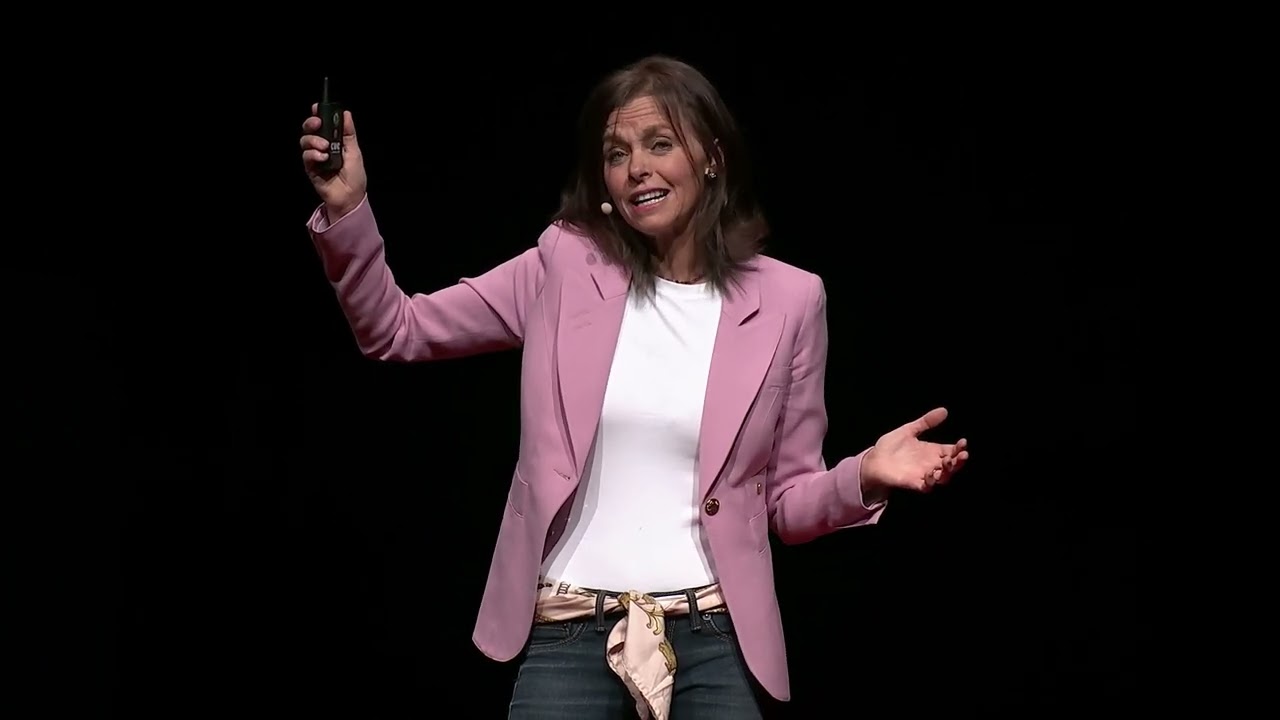
Rethink Retirement – well-being beyond your bank account | Clare Davenport | TEDxBYU
Jason 0 Comments Retire Wealthy Retirement Planning Tips for Retiree's
Transcriber: Annet Johnson
Reviewer: gaith Takrity Do you ever dream of retirement? What’s your retirement dream? Is it pure bliss and relaxation? Can you almost feel that warm wind? Taste those fruity umbrella drinks? Lounging by the pool, endless games of golf,
walking on the beach? I’ve always loved vacations, haven’t you? So I think we’re really going to love
this constant vacation space in retirement too, right? It actually reminds me of a couple I know.
Let’s call them, “Jeff and Jenny.” They’ve dreamt of retirement for years. Jeff had worked at the same company
for over 30 years. He knew everybody. He was the life of the place. And Jenny, she’d often worked two jobs
so they’d have enough. They finally did. They moved to sunny Florida, of course. But something strange started to happen. Jeff seemed lost, lonely. They started to nip at each other.
They started to quarrel. And Jenny, although she was
beginning to make community, really didn’t like to golf. She’d never been that sporty. She missed her long-time book club. She missed her best friends, her kids, her soon-to-be grandchild. What was going on? Had they not done everything right? They’d moved to sunny Florida. They’d worked with
a smart financial advisor. They’d saved enough. I ask you, if this is the dream vision
for retirement – You see it in the adverts. Why is it that so many are
dissatisfied at this age? Why is it that depression
increases by 40%? Why is it [that] substance abuse,
divorce rates are climbing? Why is everyone lonely? And people’s self-worth is low? Surely we can do better than this.
Look, I’ve spent many years consulting and coaching and researching
the ideas, tools, and frameworks that best support us
during times of transition, like retirement. Look, I’m not here to tell you
whether you should or shouldn’t retire, because maybe you should
or maybe you shouldn’t. It is up to you to design and discover. But I do want to share with you
what I know about these life changes, these life quakes, these life disruptors so we don’t end up
in a situation like Jeff and Jenny.
Look, we know that transitions
are a regular part of life. They can be trying and triumphant. They can be predictable and unpredictable because life often
doesn’t follow a straight line. But my research and others’ shows us
that if we bring our intention and attention to them,
we can improve our well-being. And we can improve our well-being
in retirement too. I like to think of it as an ROI,
a return on investment. But this time for our well-being. Think of it as the “ROI”
beyond our bank account, an investment portfolio
in human flourishing, your flourishing in retirement. Where “R” is where we reframe
our current definition of retirement. “O” is where we optimize
the well-being in retirement. And “I” is where we ignite
our way forward. So let’s “ROI,” Reframe, Optimize,
and Ignite, your retirement. Let’s start with “R”: reframe. Let’s reframe your current
definition of retirement. Look, even the word retirement
sends shivers down my spine. I really don’t like that word much. And when I look up the word “retire”
in a thesaurus, I see the strangest words: retreat, remove, exit, my personal favorite, “go to bed.” And, although I get it – It is very, very tempting
to go to bed sometimes, it does imply that we are
fading from life when in fact these years can be
some of our best years, some of our most flourishing years.
So then, how did it start? Well, historically, we never
abruptly retired. We gently moved from one stage
to another in life. And then rumor has it, this gentleman – I think he looks a bit scary, actually, German Chancellor, Otto Van Bismarck,
in 1889, created this idea, this invention of retirement
when he put in place disability insurance for those over 70. This idea was radical. But other countries followed suit,
making retirement age between 65 and 70. But what’s interesting about
this time period of 1889 was the life expectancy
was less than 44 years. A far cry from our 80′ish years today. So to be clear, this definition
or invention of retirement is over 100 years old and we have almost doubled our lifespan. So surely, can we not all agree that
we need to reframe, rethink, redesign … our retirement definition? Next, let’s “O” of the ROI, let’s optimize. Let’s optimize our well-being
in retirement. And it’s here we can learn
from some great science and research. Edward Jones asked over 9,000 retirees, “What gives you fulfillment
in retirement?” Their answers: being authentic, spending
time with those they care for, they love, doing interesting things,
things that help them grow, and being generous, giving back.
Interestingly, money was
at the bottom of the list. And, look, we know that money can
bring us freedom and flexibility. But research consistently shows us
that above a base level, money is not the secret ingredient
to happiness in life or in retirement. It’s also interesting to examine
the disconnect between what retirees are thinking about – connection, contribution, community, and pre-retirees are thinking about, which is pretty much their bank accounts
and this vacation view of retirement.

And when we look at
this vacation view of retirement, we find that over time it becomes the norm and starts to lack the joy it once did. It’s probably why
Berkeley researchers found that we have a sugar rush
of well-being when we first retire and then a year or two later
a fairly sharp decline. Behavioral economists might call it
hedonic adaptation, where one more umbrella drink, one more golf game just loses its sparkle.
We can also look into the world
of positive psychology as we continue to “O”, optimize. We can examine the science of
what makes for a good life, a happy life, a life better than fine. And it goes by the acronym, PERMAV. I like to think of it
as my well-being playbook where “P” is positive emotion,
feeling good, hopeful, inspired, loving. It’s like a micro moment of joy: a good laugh, a good meal.
“E” is engagement. Having interests in pursuits that fully
captivate us and take us away: help us grow, our relationships, having loving and authentic relationships
with another, with groups, with communities. “M” is meaning, that sense of purpose,
something beyond ourselves. “A” is accomplishment, having positive progress in life. And “V” is vitality, investing in our bodies, in our minds,
because they both matter and they work together. Look, these elements collectively
make up our well-being. They matter, they work together, and we have to bring our attention
and intention to them because they can change.
So it’s super important
in retirement to focus on these. We can also learn from the
blue zones of the world, those zones where people
fully embrace the PERMAV elements. They live flourishing lives and they live
an extra 10 to 15 years than most of us. The word retirement doesn’t even exist. Take Marie, for example. She’s amazing. She's 101, has her own garden. walks over a mile a day,
volunteers five days a week, and spends a lot of time
with her great friends and her six great grandchildren. She is thriving. She is optimizing her retirement years. Next, “I” of the ROI. Let’s ignite our path forward. Let’s take action. Let’s explore ideas. Let's sneak up on the future. We know that life is not
a fixed destination but rather a continual design project. There’s not one best option for us. There's many great options
for us in retirement.
We also know to break down
our ideas and our actions. We break them down small, so we feel comfortable taking action. We have a conversation, we explore an idea, we learn something new, but in a safe way. So we take some action. We adjust and edit and we take a little more action
as we ignite our way forward. So in closing, I invite you, all of you, to have a conversation
about your retirement. But maybe a little differently this time. It is never too early
and it’s never too late. Let’s create a retirement canvas full of the colors and
textures of well-being and ignited by our boundless
designs and imaginations, like Jeff and Jenny did.
They moved back from Florida. They still vacation there sometimes. They bought a smaller condo,
two doors down from their best friend. Jeff decided to go back to work part-time, and he’s taking improv
classes twice a week. And Jenny, she’s enrolled
in doing a Masters in English and still loving her long-time book club. They are prioritizing their friends, their family, and their new grandchild. They are thriving. So … what about you? Let’s begin to ROI
your retirement chapter. Let’s start with “R”, refrain. What does retirement now mean to you? And what beliefs are
no longer serving you? “O”, optimize.
Who and what will you prioritize and how will you use your many,
many strengths and skills? And how does this compare
with those you care for? And “I”, ignite. What is one small step
you could take today to better understand
your “retirement act,” knowing the best can be yet to come. Thank you. (Applause).
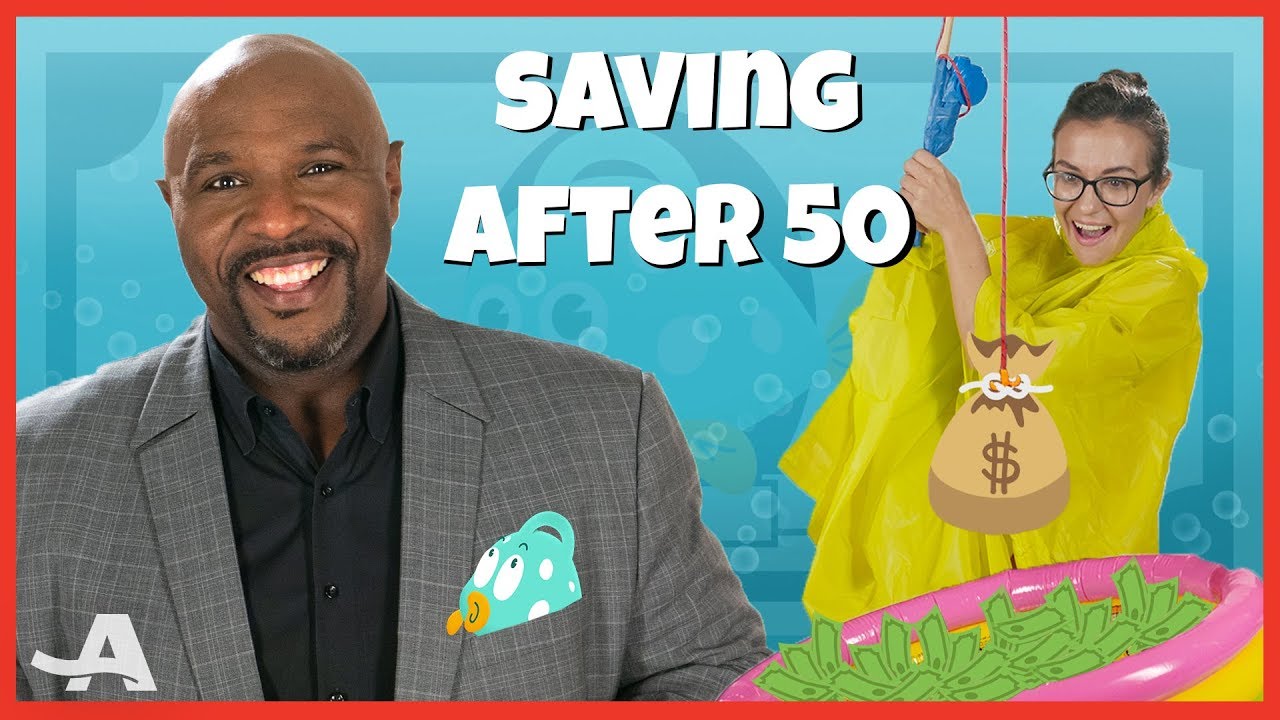
ZERO Savings at 50? Plan for Retirement NOW 💰
Jason 0 Comments Retire Wealthy Retirement Planning Tips for Retiree's
What are we doing here? What's going on?
>>What are we doing here? >>This is a super-simple game. We're fishing for advice. Give me that.
>>See, I chose the right outfit today.
Yeah. [Fishing for Advice With Financial Advisers] I know you guys are probably thinking
I'm a professional fisherman, but I'm not. I'm a financial coach. You are 50 years old and have not started
saving for retirement. What is the first thing you do? Panic! No, I'm just kidding.
So, at 50 years old, that is a big
wake-up call for a lot of people, and the very first thing you do is take stock of where your money is going today, because
you are gonna need to seriously amp up your saving. So, not everybody needs to
have some giant savings. You need to have enough to replace the amount of income
you're gonna spend in retirement. I'm gonna just cheat a little, because I'm
really embarrassed. So I would just take a minute to assess my full
financial picture and actually sit down with the numbers to take financial
inventory. So I think step 1 is just going through what are all the
accounts I have, what is everything I own, what's the value of everything I own, and
then making another list of everything that I owe. And then from there you can
be like, "OK, well, this is the money that I actually do have, and so maybe there's a
better way for me to maximize this for my retirement." I feel like 50 is the new 20 or
30, you know, still not too late.
Yeah, don't think that it's over.
Consider it like a halftime. This is where you go
into the locker room and you look at what you did in the first half and what
can be done better for the second half. You come up with a new strategy, a new game plan, and then you go out into the second half,
and you prepare to win the game. [Cheering] I have to say this is the weirdest game
I've ever played at a FinCon.

You're 50 years old — I am 50 years old — and
have not started saving for retirement. What's the first thing you do? You breathe, and you don't panic, and you start now. What you should not do is
think, "Well, it's too late now, so let's just see what happens in the next 20, 30
years." Because that is going to lead to disaster. You still have time to turn this around,
but you have to get serious about this now. So you would talk to a
financial planner, come up with a game plan of how you can reduce your spending,
how you could put extra money into savings, and how you can kind of catch up. Once you've found the money, you are gonna automate the flows into those IRAs and 401(k)s, because if you don't automate it, you're gonna force
yourself to go through this exercise again and again, but if you set it and
forget it, you will continue to make headway.
All right, here we go. It’s why I got this net, man. The first thing I want you to do, I want you to take positive action. I want you to look around this minute, right now, and make a decision on some things you're gonna change. And it might be your attitude, it might be
the way that you're spending money, it might be the way that you're even looking at money. Be positive.
You know, it's not over till it's over. You can do it, you just have to start
doing it right now. Whoops! All right, everyone, listen. Gaining
information is absolutely imperative. It keeps you aware and it keeps you motivated. So be sure to subscribe to AARP's YouTube channel. OK, come on. All right. I'm just gonna pick these
fish up. OK! [Laughter].

How To Save For Retirement: Suze Orman Shares Her Best Money Advice | TODAY
Jason 0 Comments Retire Wealthy Retirement Planning Tips for Retiree's
>>> AND WE’RE BACK WITH OUR >>> AND WE’RE BACK WITH OUR SPECIAL SERIES LIVING LONGER SPECIAL SERIES LIVING LONGER TODAY, EXPLORING WAYS TO LIVER TODAY, EXPLORING WAYS TO LIVER NOT ONLY LONGER BUT BETTER. NOT ONLY LONGER BUT BETTER. >> THIS MORNING WE’RE FOCUSING >> THIS MORNING WE’RE FOCUSING ON YOUR FINANCES AND THE NEW ON YOUR FINANCES AND THE NEW ADVICE EXPERTS ARE GIVING TO ADVICE EXPERTS ARE GIVING TO MAKE YOUR MONEY REALLY LAST. MAKE YOUR MONEY REALLY LAST. >> THE GOOD NEWS AMERICANS ARE >> THE GOOD NEWS AMERICANS ARE LIVING LONGER, WHAT THAT MEANS, LIVING LONGER, WHAT THAT MEANS, A NEW FOCUS ON MAKING YOUR MONEY A NEW FOCUS ON MAKING YOUR MONEY LAST. LAST. >> AS YOU’RE PLANNING FOR YOUR >> AS YOU’RE PLANNING FOR YOUR FUTURE, DON’T UNDERESTIMATE HOW FUTURE, DON’T UNDERESTIMATE HOW LONG YOU’RE GOING TO LIVE. LONG YOU’RE GOING TO LIVE. >> IN FACT, ABOUT ONE OUT OF >> IN FACT, ABOUT ONE OUT OF EVERY FOUR 65-YEAR-OLDS TODAY EVERY FOUR 65-YEAR-OLDS TODAY WILL LIVE PAST 90.
WILL LIVE PAST 90. >> THE OLD ADVICE USED TO BE >> THE OLD ADVICE USED TO BE THAT AS YOU’RE PLANNING FOR THAT AS YOU’RE PLANNING FOR RETIREMENT EXPECT TO LIVE INTO RETIREMENT EXPECT TO LIVE INTO YOUR 80s. YOUR 80s. NOW THE EXPECTATION IS THAT NOW THE EXPECTATION IS THAT YOU’LL HAVE A GOOD CHANCE OF YOU’LL HAVE A GOOD CHANCE OF LIVING INTO YOUR 90s, MAYBE EVEN LIVING INTO YOUR 90s, MAYBE EVEN CELEBRATING YOUR 100th BIRTHDAY. CELEBRATING YOUR 100th BIRTHDAY. >> WITH LONGEVITY CAN COME THE >> WITH LONGEVITY CAN COME THE ADDED STRESS TO SAVE MORE. ADDED STRESS TO SAVE MORE. >> PLANNING FOR THE FUTURE HAS >> PLANNING FOR THE FUTURE HAS BECOME A LOT MORE CHALLENGING BECOME A LOT MORE CHALLENGING AND REALLY THE ONUS IS NOW ON AND REALLY THE ONUS IS NOW ON THE INDIVIDUAL MORE THAN EVER.
THE INDIVIDUAL MORE THAN EVER. >> SO HOW DO WE MAKE SURE WE’RE >> SO HOW DO WE MAKE SURE WE’RE FINANCIALLY PREPARED FOR ALL FINANCIALLY PREPARED FOR ALL THOSE EXTRA YEARS? THOSE EXTRA YEARS? IT’S EASY. IT’S EASY. JUST CALL SUZE ORMAN, A PERSONAL JUST CALL SUZE ORMAN, A PERSONAL FINANCE EXPERT. FINANCE EXPERT. SHE HOSTS SUZE ORMAN’S WOMEN AND SHE HOSTS SUZE ORMAN’S WOMEN AND MANY PODCASTS. MANY PODCASTS. >> WE’RE LIVING LONGER. >> WE’RE LIVING LONGER. THAT’S GREAT, BUT THE BAD NEWS THAT’S GREAT, BUT THE BAD NEWS IS, WE SURVEYED OUR TODAY.COM IS, WE SURVEYED OUR TODAY.COM AUDIENCE.
AUDIENCE. THEY SAID 60% OF THEM FELT LIKE THEY SAID 60% OF THEM FELT LIKE THEY DON’T HAVE THE AMOUNT OF THEY DON’T HAVE THE AMOUNT OF MONEY THAT THEY’RE SAVING RIGHT MONEY THAT THEY’RE SAVING RIGHT NOW THAT, THAT IT WON’T LAST NOW THAT, THAT IT WON’T LAST THEM THROUGH THEIR RETIREMENT. THEM THROUGH THEIR RETIREMENT. >> IF YOU REALLY THINK ABOUT IT, >> IF YOU REALLY THINK ABOUT IT, YOU GUYS, MOST PEOPLE BARELY YOU GUYS, MOST PEOPLE BARELY HAVE THE MONEY TO PAY THEIR HAVE THE MONEY TO PAY THEIR BILLS TODAY LET ALONE SAVE IN BILLS TODAY LET ALONE SAVE IN THEIR MINDS FOR THE FUTURE.
THEIR MINDS FOR THE FUTURE. >> PEOPLE FEEL LIKE THEY CAN’T >> PEOPLE FEEL LIKE THEY CAN’T SAVE. SAVE. >> THEY JUST FEEL THAT WAY, AND >> THEY JUST FEEL THAT WAY, AND THEY HAVE TO CHANGE THAT BECAUSE THEY HAVE TO CHANGE THAT BECAUSE THEY ARE GOING TO SPEND MORE THEY ARE GOING TO SPEND MORE YEARS IN RETIREMENT THAN THEY YEARS IN RETIREMENT THAN THEY EVER DID WORKING IF YOU THINK EVER DID WORKING IF YOU THINK ABOUT IT BECAUSE MOST PEOPLE ABOUT IT BECAUSE MOST PEOPLE THINK THEY’RE GOING TO RETIRE AT THINK THEY’RE GOING TO RETIRE AT 65, MAYBE THEY WORK 30 YEARS, 65, MAYBE THEY WORK 30 YEARS, THEY’RE GOING TO LIVE TO 100 THEY’RE GOING TO LIVE TO 100 POSSIBLY. POSSIBLY.
>> OENGWNING A HOUSE WAS ALWAYS >> OENGWNING A HOUSE WAS ALWAYS THE PLAN, BUT FOR THESE THE PLAN, BUT FOR THESE MILLENNIALS, THEY’RE OPEN ABOUT MILLENNIALS, THEY’RE OPEN ABOUT THE FACT THEY THINK THEY’LL THE FACT THEY THINK THEY’LL NEVER BE ABLE TO AFFORD A HOUSE, NEVER BE ABLE TO AFFORD A HOUSE, NEVER MIND SOME LONGEVITY OR NEVER MIND SOME LONGEVITY OR 401(k).
401(k). >> THAT’S NOT SUCH A HORRIBLE >> THAT’S NOT SUCH A HORRIBLE THING. THING. I DON’T THINK THAT THE KEY TO I DON’T THINK THAT THE KEY TO YOUR RETIREMENT IS OWNING A YOUR RETIREMENT IS OWNING A HOME. HOME. I THINK THE KEY TO YOUR I THINK THE KEY TO YOUR RETIREMENT IS HAVING ENOUGH RETIREMENT IS HAVING ENOUGH MONEY TO PAY WHATEVER YOUR MONEY TO PAY WHATEVER YOUR EXPENSES HAPPEN TO BE SO THE KEY EXPENSES HAPPEN TO BE SO THE KEY IS TO GET RID OF AS MUCH IS TO GET RID OF AS MUCH EXPENSES AS YOU CAN, DON’T HAVE EXPENSES AS YOU CAN, DON’T HAVE DEBT. DEBT. IF YOU DO HAVE A HOME, MAKE SURE IF YOU DO HAVE A HOME, MAKE SURE YOUR MORTGAGE IS PAID OFF BY THE YOUR MORTGAGE IS PAID OFF BY THE TIME YOU RETIRE. TIME YOU RETIRE. THAT WOULD BE MY NUMBER ONE TIP THAT WOULD BE MY NUMBER ONE TIP TO TELL EVERYBODY THEY HAVE GOT TO TELL EVERYBODY THEY HAVE GOT TO DO IF THEY DO OWN A HOME.
TO DO IF THEY DO OWN A HOME. >> WE’RE GOING TO GET INTO THAT. >> WE’RE GOING TO GET INTO THAT. WE HAVE THE THREE W’S. WE HAVE THE THREE W’S. THE FIRST IS WHERE. THE FIRST IS WHERE. WHERE IS THE BEST PLACE TO WHERE IS THE BEST PLACE TO INVEST YOUR MONEY SO IF YOU DO INVEST YOUR MONEY SO IF YOU DO HAVE 30ISH YEARS OF RETIREMENT HAVE 30ISH YEARS OF RETIREMENT YOU’RE SET? YOU’RE SET? >> I’VE SAID FOR A LONG TIME, >> I’VE SAID FOR A LONG TIME, JUST FORGET THE TAX WRITE OFFS JUST FORGET THE TAX WRITE OFFS OF YOUR PRETAX 401(k) OR IRA. OF YOUR PRETAX 401(k) OR IRA. FORGET THOSE NOW, AND IF YOUR FORGET THOSE NOW, AND IF YOUR CORPORATION OFFERS IT, CAN YOU CORPORATION OFFERS IT, CAN YOU CO CO DO A ROTH 401(k) OR A ROTH IRA DO A ROTH 401(k) OR A ROTH IRA WHICH ARE AFTER TAX WHICH ARE AFTER TAX CONTRIBUTIONS.
CONTRIBUTIONS. WHY? WHY? YOU DON’T HAVE TO WORRY WHAT THE YOU DON’T HAVE TO WORRY WHAT THE TAX BRACKETS ARE GOING TO BE 20, TAX BRACKETS ARE GOING TO BE 20, 30, AND 40 YEARS FROM NOW. 30, AND 40 YEARS FROM NOW. I PERSONALLY THINK THEY’RE GOING I PERSONALLY THINK THEY’RE GOING TO SKYROCKET OVER THE YEARS, SO TO SKYROCKET OVER THE YEARS, SO THEREFORE WHAT YOU SEE IS WHAT THEREFORE WHAT YOU SEE IS WHAT YOU GET IN A ROTH IRA OR A ROTH YOU GET IN A ROTH IRA OR A ROTH 401(k). 401(k). AGAIN, IT’S PRETAX VERSUS AFTER AGAIN, IT’S PRETAX VERSUS AFTER TAX, BUT AFTER THAT IT’S TAX TAX, BUT AFTER THAT IT’S TAX DEFERRED VERSUS TAX FREE. DEFERRED VERSUS TAX FREE. IT’S FOR YOUR BENEFICIARIES IN A IT’S FOR YOUR BENEFICIARIES IN A PRETAX ACCOUNT THEY’RE GOING TO PRETAX ACCOUNT THEY’RE GOING TO PAY TOTAL TAXES ON IT. PAY TOTAL TAXES ON IT.
>> LET’S GO BACK TO DEBT FOR A >> LET’S GO BACK TO DEBT FOR A SECOND. SECOND. FOR PEOPLE WHO HAVE STUDENT FOR PEOPLE WHO HAVE STUDENT LOANS, THEY’VE GOT CREDIT CARDS, LOANS, THEY’VE GOT CREDIT CARDS, THEY’VE GOT THAT MORTGAGE. THEY’VE GOT THAT MORTGAGE. HOW DO YOU PRIORITIZE THE DEBT? HOW DO YOU PRIORITIZE THE DEBT? WHAT DO YOU PAY AND WHEN? WHAT DO YOU PAY AND WHEN? >> STUDENT LOAN DEBT IS THE MOST >> STUDENT LOAN DEBT IS THE MOST DANGEROUS DEBT YOU CAN HAVE BAR DANGEROUS DEBT YOU CAN HAVE BAR NONE BECAUSE IN 90% OF THE NONE BECAUSE IN 90% OF THE CASES, 99%, IT IS NOT CASES, 99%, IT IS NOT DISCHARGEABLE IN BANKRUPTCY. DISCHARGEABLE IN BANKRUPTCY. SO THEY HAVE THE LEGAL AUTHORITY SO THEY HAVE THE LEGAL AUTHORITY TO GARNISH YOUR WAGES AND TO TO GARNISH YOUR WAGES AND TO REALLY THEN DECREASE YOUR INCOME REALLY THEN DECREASE YOUR INCOME SO STUDENT LOAN — SO STUDENT LOAN — >> TAKE CARE OF THAT FIRST.
>> TAKE CARE OF THAT FIRST. >> FIRST THAT. >> FIRST THAT. THEN IF YOU HAVE CREDIT CARD THEN IF YOU HAVE CREDIT CARD DEBT THAT NEEDS TO GO BECAUSE DEBT THAT NEEDS TO GO BECAUSE DEBT IS BONDAGE. DEBT IS BONDAGE. YOU GOT TO GET OUT OF THAT. YOU GOT TO GET OUT OF THAT. AND THEN YOU START WORKING, IF AND THEN YOU START WORKING, IF YOU’RE GOING TO STAY IN YOUR YOU’RE GOING TO STAY IN YOUR HOME FOR THE REST OF YOUR LIFE, HOME FOR THE REST OF YOUR LIFE, GET RID OF YOUR MORTGAGE GET RID OF YOUR MORTGAGE PAYMENT.

PAYMENT. >> I WANT TO FOLLOW UP ON THAT. >> I WANT TO FOLLOW UP ON THAT. YOU DON’T WANT TO HAVE A YOU DON’T WANT TO HAVE A MORTGAGE, A LIVE MORTGAGE STILL MORTGAGE, A LIVE MORTGAGE STILL GOING BY THE TIME YOU RETIRE. GOING BY THE TIME YOU RETIRE. WHY? WHY? >> BECAUSE YOUR MORTGAGE PAYMENT >> BECAUSE YOUR MORTGAGE PAYMENT IS YOUR HIGHEST MONTHLY EXPENSE IS YOUR HIGHEST MONTHLY EXPENSE THAT YOU’RE GOING TO HAVE BAR THAT YOU’RE GOING TO HAVE BAR NONE.
NONE. >> WHEN YOU RETIRE. >> WHEN YOU RETIRE. >> IT’S FAR EASIER TO PAY OFF >> IT’S FAR EASIER TO PAY OFF YOUR MORTGAGE THAN TO SAVER THE YOUR MORTGAGE THAN TO SAVER THE MONEY TO GENERATE THE INCOME TO MONEY TO GENERATE THE INCOME TO PAY OFF YOUR MORTGAGE. PAY OFF YOUR MORTGAGE. YOUR GOAL IN RETIREMENT IS TO BE YOUR GOAL IN RETIREMENT IS TO BE TOTALLY DEBT FREE 100% IN TOTALLY DEBT FREE 100% IN RETIREMENT. RETIREMENT. IF YOU DON’T HAVE ENOUGH MONEY, IF YOU DON’T HAVE ENOUGH MONEY, DECREASE YOUR EXPENSES, AND THEN DECREASE YOUR EXPENSES, AND THEN YOUR MONEY WILL GO FURTHER. YOUR MONEY WILL GO FURTHER. >> GOT YOU. >> GOT YOU. >> WHAT ABOUT WHEN, WHEN DO YOU >> WHAT ABOUT WHEN, WHEN DO YOU START? START? I KNOW, WHEN WE’RE BORN WE I KNOW, WHEN WE’RE BORN WE SHOULD START SAVING.
SHOULD START SAVING. >> YOU HAVE THE 200 BUCKS WHEN >> YOU HAVE THE 200 BUCKS WHEN YOU’RE 30. YOU’RE 30. >> PEOPLE ALWAYS THINK THEY HAVE >> PEOPLE ALWAYS THINK THEY HAVE TIME, TIME IS THE MOST IMPORTANT TIME, TIME IS THE MOST IMPORTANT INGREDIENT IN YOUR RETIREMENT INGREDIENT IN YOUR RETIREMENT RECIPE. RECIPE. LET’S JUST SAY YOU HAVE 40 LET’S JUST SAY YOU HAVE 40 YEARS. YEARS. YOU’RE YOUNG. YOU’RE YOUNG. YOU HAVE 40 YEARS UNTIL YOU’RE YOU HAVE 40 YEARS UNTIL YOU’RE GOING TO BE 70. GOING TO BE 70. YOU PUT $200 A MONTH AWAY INTO A YOU PUT $200 A MONTH AWAY INTO A ROTH IRA OR ROTH 401(k).
ROTH IRA OR ROTH 401(k). AVERAGE MARKET RETURNS, DO YOU AVERAGE MARKET RETURNS, DO YOU KNOW THAT YOU WOULD HAVE KNOW THAT YOU WOULD HAVE $1.1 MILLION AT 70, WHICH I $1.1 MILLION AT 70, WHICH I THINK SHOULD BE THE NEW THINK SHOULD BE THE NEW RETIREMENT AGE, BUT YOU WAIT TEN RETIREMENT AGE, BUT YOU WAIT TEN YEARS. YEARS. >> YOU’RE TALKING ABOUT HAVING A >> YOU’RE TALKING ABOUT HAVING A SURPLUS OF 200 BUCK WHEN IS SURPLUS OF 200 BUCK WHEN IS YOU’RE 30. YOU’RE 30. SHOULD YOU TAKE THAT 200 AND SHOULD YOU TAKE THAT 200 AND APPLY IT TO ONE OF THESE OTHER APPLY IT TO ONE OF THESE OTHER THINGS. THINGS. >> YOU NEED TO BE SAVING >> YOU NEED TO BE SAVING ESPECIALLY IN A 401(k), ESPECIALLY IN A 401(k), ESPECIALLY IF THEY MATCH YOUR ESPECIALLY IF THEY MATCH YOUR CONTRIBUTION. CONTRIBUTION. YOU PUT IN A DOLLAR, THEY GIVE YOU PUT IN A DOLLAR, THEY GIVE YOU $0.50. YOU $0.50. I DON’T CARE IF YOU HAVE ANY I DON’T CARE IF YOU HAVE ANY MONEY. MONEY. YOU CAN’T PASS UP FREE MONEY.
YOU CAN’T PASS UP FREE MONEY. IF YOU STARTED PUTTING, JUST IF YOU STARTED PUTTING, JUST LET’S SAY $200 A MONTH AWAY, AND LET’S SAY $200 A MONTH AWAY, AND YOU NOW ONLY HAVE 30 YEARS LEFT YOU NOW ONLY HAVE 30 YEARS LEFT VERSUS 40, YOU’D ONLY HAVE LIKE VERSUS 40, YOU’D ONLY HAVE LIKE $400,000. $400,000. YOU JUST BLEW $700,000 BECAUSE YOU JUST BLEW $700,000 BECAUSE YOU WAITED TEN YEARS. YOU WAITED TEN YEARS. IT WAS ONLY A $24,000 DIFFERENCE IT WAS ONLY A $24,000 DIFFERENCE IN THOSE TEN YEARS. IN THOSE TEN YEARS. BUT THE TEN YEARS, THE SOONER BUT THE TEN YEARS, THE SOONER YOU BEGIN, THE BETTER YOU’LL BE. YOU BEGIN, THE BETTER YOU’LL BE. >> JUST TO CARSON’S POINT. >> JUST TO CARSON’S POINT. IF I HAVE 200 BUCKS TO SPARE,KY IF I HAVE 200 BUCKS TO SPARE,KY CAN EITHER PAY OFF MY CREDIT CAN EITHER PAY OFF MY CREDIT CARD DEBT AND START SAVING IN A CARD DEBT AND START SAVING IN A ROTH IRA, WHAT WOULD MY CHOICE ROTH IRA, WHAT WOULD MY CHOICE BE? BE? >> YOUR CHOICE THERE IS TO PAY >> YOUR CHOICE THERE IS TO PAY OFF YOUR CREDIT CARD DEBT.
OFF YOUR CREDIT CARD DEBT. >> IF YOU DON’T HAVE MUCH MONEY >> IF YOU DON’T HAVE MUCH MONEY YOU MAY BE BEHIND ON YOUR CREDIT YOU MAY BE BEHIND ON YOUR CREDIT CARD PAYMENTS, AND YOUR INTEREST CARD PAYMENTS, AND YOUR INTEREST RATES ARE 15, 18%. RATES ARE 15, 18%. THAT’S A GUARANTEED RETURN. THAT’S A GUARANTEED RETURN. WHEN YOU PAY OFF YOUR CREDIT WHEN YOU PAY OFF YOUR CREDIT CARD DEBT, YOU’RE GUARANTEEING A CARD DEBT, YOU’RE GUARANTEEING A FANTASTIC RETURN. FANTASTIC RETURN. >> WHAT IS THE ONE SMALL THING >> WHAT IS THE ONE SMALL THING YOU WOULD TELL OUR VIEWERS YOU WOULD TELL OUR VIEWERS BEFORE WE GO? BEFORE WE GO? >> HERE’S WHAT’S REALLY >> HERE’S WHAT’S REALLY IMPORTANT. IMPORTANT. MANY PEOPLE HAVE ADVICE FOR ALL MANY PEOPLE HAVE ADVICE FOR ALL OF YOU. OF YOU. SOMETIMES THAT ADVICE IS GOOD SOMETIMES THAT ADVICE IS GOOD FOR THE PERSON GIVING THE FOR THE PERSON GIVING THE ADVICE, AND SOMETIMES IT’S GOOD ADVICE, AND SOMETIMES IT’S GOOD FOR THE PERSON RECEIVING IT.
FOR THE PERSON RECEIVING IT. MY ADVICE IS THIS, PLEASE DON’T MY ADVICE IS THIS, PLEASE DON’T DO ANYTHING THAT YOU DON’T DO ANYTHING THAT YOU DON’T UNDERSTAND. UNDERSTAND. IT IS BETTER TO DO NOTHING THAN IT IS BETTER TO DO NOTHING THAN TO DO SOMETHING YOU DO NOT TO DO SOMETHING YOU DO NOT UNDERSTAND BECAUSE SOMETIMES YOU UNDERSTAND BECAUSE SOMETIMES YOU CAN DO SOMETHING AND IT BLOWS CAN DO SOMETHING AND IT BLOWS ALL YOUR MONEY, AND SO IF IT ALL YOUR MONEY, AND SO IF IT DOESN’T FEEL RIGHT TO YOU, YOU DOESN’T FEEL RIGHT TO YOU, YOU HAVE TO TRUST YOURSELF MORE THAN HAVE TO TRUST YOURSELF MORE THAN YOU TRUST OTHERS.
YOU TRUST OTHERS. IT’S YOUR MONEY, AND WHAT IT’S YOUR MONEY, AND WHAT HAPPENS TO YOUR MONEY IS GOING HAPPENS TO YOUR MONEY IS GOING TO DIRECTLY AFFECT THE QUALITY TO DIRECTLY AFFECT THE QUALITY OF YOUR LIFE, NOT MY LIFE. OF YOUR LIFE, NOT MY LIFE. NOT ANYBODY ELSE’S LIFE, SO IF NOT ANYBODY ELSE’S LIFE, SO IF YOU REALLY WANT TO BE POWERFUL YOU REALLY WANT TO BE POWERFUL IN LIFE, YOU HAVE TO BE POWERFUL IN LIFE, YOU HAVE TO BE POWERFUL OVER YOUR OWN MONEY.
OVER YOUR OWN MONEY. >> THAT’S GOOD ADVICE. >> THAT’S GOOD ADVICE. IN SOME CASES FINANCIALLY DOING IN SOME CASES FINANCIALLY DOING NOTHING IS BETTER THAN MAKING A NOTHING IS BETTER THAN MAKING A CHOICE TO YOUR DETRIMENT. CHOICE TO YOUR DETRIMENT. >> NEVER TALK YOURSELF INTO >> NEVER TALK YOURSELF INTO TRUSTING ANYONE. TRUSTING ANYONE. YOU WALK INTO A FINANCIAL YOU WALK INTO A FINANCIAL ADVISER’S OFFICE AND THEY FEEL ADVISER’S OFFICE AND THEY FEEL LIKE THEY KNOW WHAT YOU’RE LIKE THEY KNOW WHAT YOU’RE DOING. DOING. THEY MUST KNOW, YOU DON’T KNOW THEY MUST KNOW, YOU DON’T KNOW AND YOU BELIEVE THEM. AND YOU BELIEVE THEM. SOMETIMES THEY GIVE GREAT AED SOMETIMES THEY GIVE GREAT AED VICE AND SOMETIMES THEY GIVE VICE AND SOMETIMES THEY GIVE ADVICE THAT’S NOT SO MUCH. ADVICE THAT’S NOT SO MUCH.
>> THAT STUFF’S TRUE IN >> THAT STUFF’S TRUE IN ANYTHING, RIGHT? ANYTHING, RIGHT? >> WHEN YOU THINK ABOUT IT, >> WHEN YOU THINK ABOUT IT, SAVANNAH, YOUR MONEY AND YOUR SAVANNAH, YOUR MONEY AND YOUR LIFE ARE ONE. LIFE ARE ONE. WHO YOU ARE AND WHAT YOU HAVE IS WHO YOU ARE AND WHAT YOU HAVE IS ONE. ONE. IT’S YOU’RE THE ONE WHO EARNS IT’S YOU’RE THE ONE WHO EARNS IT.
IT. YOU’RE THE ONE WHO INVESTS IT. YOU’RE THE ONE WHO INVESTS IT. YOU’RE THE ONE WHO SAVES IT, AND YOU’RE THE ONE WHO SAVES IT, AND YOU’RE THE ONE WHO’S GOING TO YOU’RE THE ONE WHO’S GOING TO LIVE. LIVE. >> WE’LL JUST GO TO YOU. >> WE’LL JUST GO TO YOU. YOU’RE OUR TRUSTED SOURCE. YOU’RE OUR TRUSTED SOURCE. >> COME ON, EVERYBODY, COME JOIN.
Read More
Brian Tracy | The 80/20 Rule for Wealth Growth #shrots
Jason 0 Comments Retire Wealthy
the 80/20 rule the bottom 80% of people the ones who struggle for money and worry about money all their lives these people when they take their first job will work to a certain level and then they will level off and never improve for the rest of their lives unless they're forced to and so therefore 10 years after starting work the average person today is no more productive at getting results than they were after one year but they find that the people in the top 20% are very different the people in the bottom 80% increase their income about 2 or 3 % per year people in the top 20% increase their income at an average of about 11% per year.

.gif)


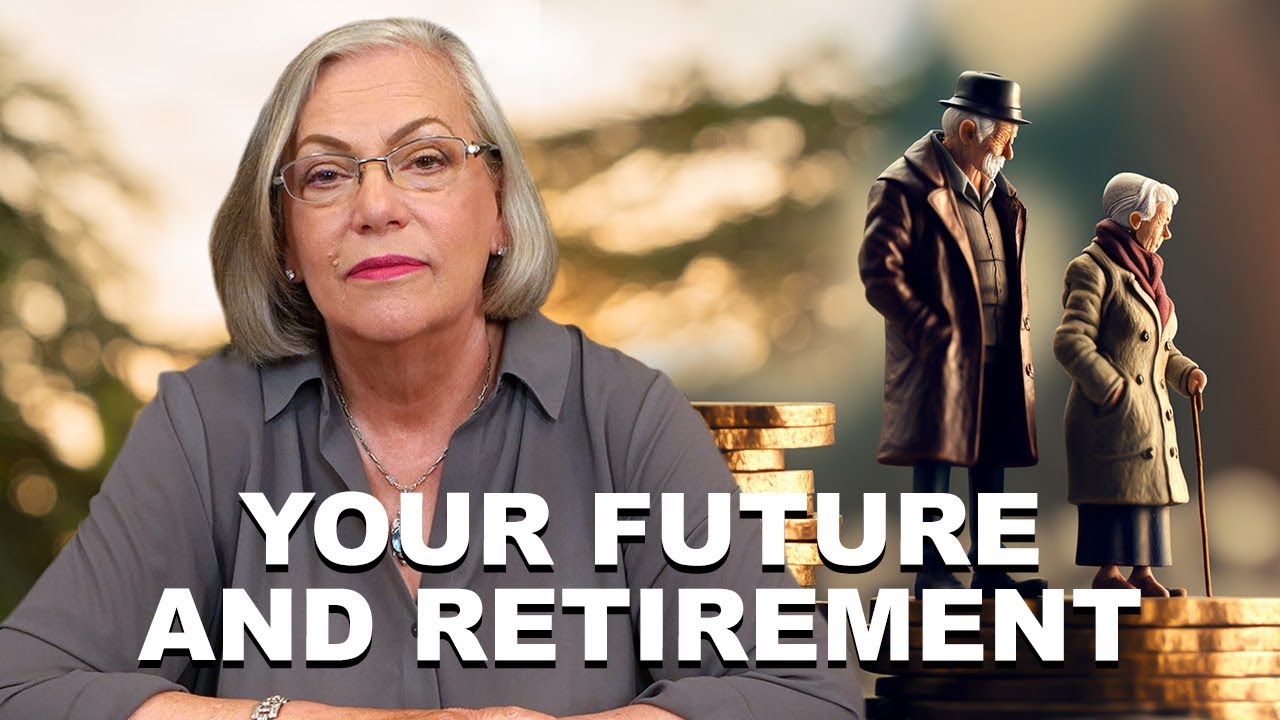


Recent Comments